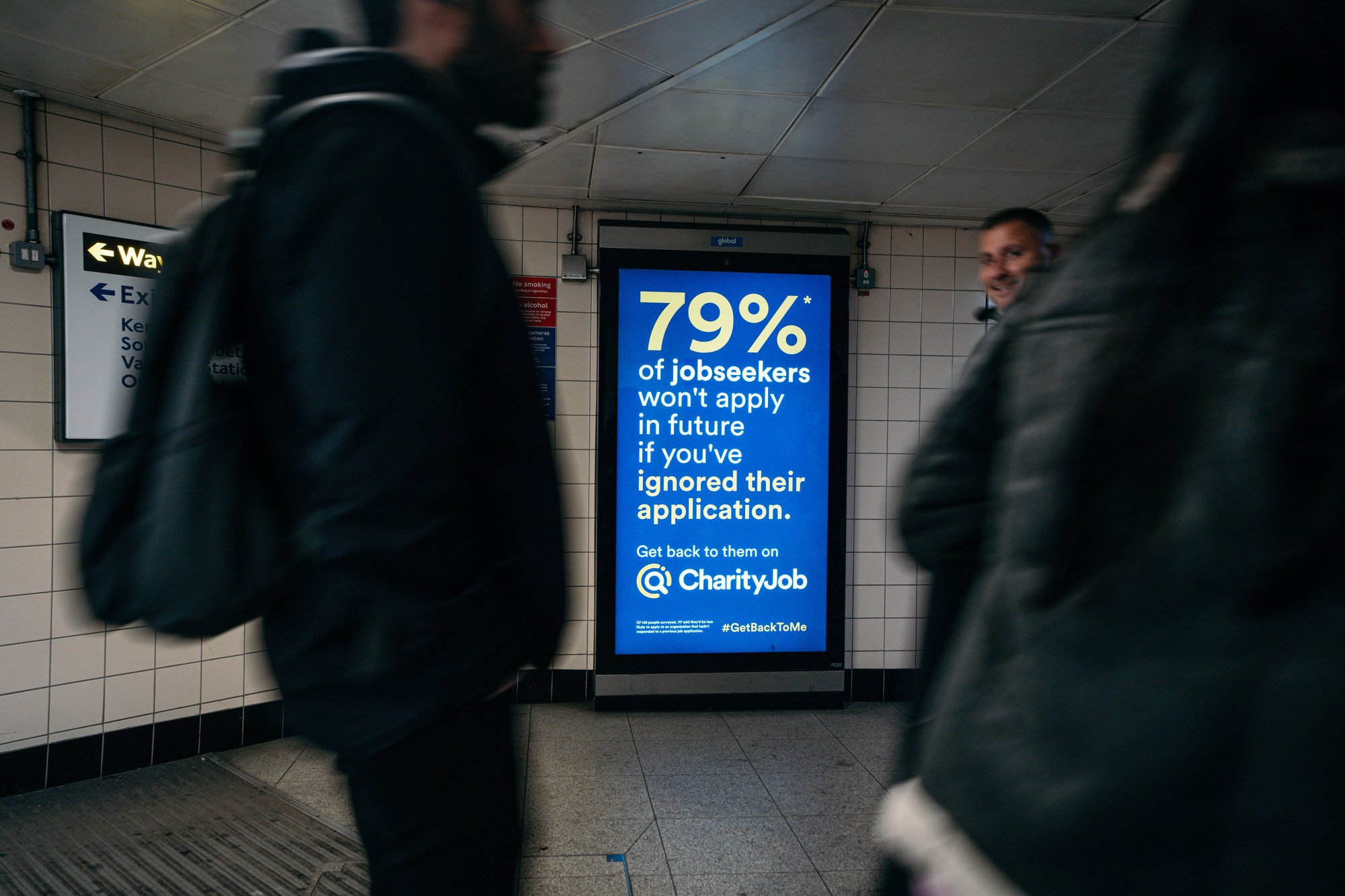Article menu
Have you ever spent hours that you couldn’t really spare, painstakingly completing a long job application, only to never hear if it was even received by the recruiter?
Or even worse, have you dedicated precious time preparing for and attending an interview, just to be rewarded with radio silence?
Almost all of us have been there—it’s stressful, frustrating and it hurts. It makes you feel undervalued—that the time and effort you put in to responding to the recruiter’s advert wasn’t worth anything, and neither was your resulting application.
Unfortunately this is an all-too-common scenario. Research suggests that 75% of applicants never hear back from employers after applying for a job and 60% never hear back after an interview. That just isn’t good enough.
We know recruiters are busy, especially in the last few years. But not finding the time to respond to candidates can have huge repercussions for your future hiring potential, as well as your charity’s reputation. Also, let’s face it—it’s common courtesy. And in a competitive market, it’s just not worth the risk.
The good news is, with the right tools, it can take less than five minutes to respond to all of your applicants, no matter how many you get.
What candidates told us
To better support both our candidates and recruiters in this difficult recruitment market, in October 2022 we surveyed candidates who had used our website to search and apply for jobs in the last six months. We heard back from almost 500 candidates and when asked to select the pain points they face when applying for jobs from a list, 54% selected ‘not hearing back from employers about job applications’.
We also asked candidates for one piece of advice they wanted to give to recruiters, and a large number of them felt very strongly that recruiters should always get back to them. The issue was two-fold: they felt that they should at least always be informed if their application was unsuccessful, and that they should receive proper feedback if they were turned down at interview stage.
Here are some of their responses:
“Acknowledge all applications whether or not an applicant is going to be progressed. In this age of email it is simple to do… Some applications take a long time and it is downright rude not to acknowledge. Some application portals are just as bad—I have one application that has been acknowledged but nothing further has happened since August. It is really off putting.”
“Respond to applications regardless of outcome. It takes a lot of time to put in a proper application and so it’s hard when it is met with silence.”
“Provide feedback to unsuccessful applicants. They’ve often put many hours into their applications, and by the time you’ve assessed their suitability, it should only take you a few minutes to give individual feedback.”
“Reply. It is only courteous to acknowledge an application and to let applicants know the outcome… It is bad for the brand of the charity to not reply, it shows a lack of professionalism and awareness. An applicant is a potential future donor or volunteer…ignore them at your peril.”
“Treat your applicants with respect. Acknowledge the applications.”
“Feedback is important, passing through multiple interview processes after which no response is cruel.”
“Feedback or just getting a reply! It’s very demoralising when you hear nothing!”

Why you should respond to applicants
While we’re in a candidate-driven market, it’s more important than ever for recruiters to focus on your brand, culture and application experience if you want to succeed in the battle for talent. It seems obvious that not hearing back from a recruiter would negatively influence a candidate’s experience, and yet so many recruiters continue not to do this very simple thing, despite the huge impact it can have on perceptions of your brand and charity.
If you don’t get back to candidates then it will prevent them from applying for other roles with you in the future. Our research found that 79% of candidates are less likely to apply to an organisation again if they hadn’t had a response to a previous job application.
It will also deter other potential candidates who hear about these negative experiences via reviews or word of mouth. Research by Glassdoor found that as many as 86% of job seekers look at organisations’ reviews before deciding where to apply for a job.
If you leave a positive impression by thanking candidates for applying and letting them know the outcome of their application, they’re more likely to apply to work for you again in the future. And an applicant who isn’t right for one role may be perfect for another.
How to respond to applicants
The good news is, if you post a job with us using Quick Apply, you get free access to Applicant Manager, our end-to-end hiring platform that makes it quick and easy to reply to all candidates.
The platform allows you to send a variety of personalised emails to candidates all from one place, in just a few clicks. You can customise one of our template rejection emails and efficiently send to unsuccessful applicants in bulk, or you can create your own, specific to your charity.

Our campaign: #GetBackToMe
In an age where it’s so quick and easy to do, and a market where it’s so important to respond to applicants we don’t think it’s acceptable that this still isn’t happening. So we’ve launched a campaign to encourage all recruiters to always get back to all of your candidates, no matter what stage their application reaches.
Will you join us and promise to get back to all of your candidates?
Show your support for our campaign. #GetBackToMe
Looking for a way to simplify your recruitment process? Advertise a job with us and save time with our end-to-end hiring platform, designed to streamline recruitment and make the process of hiring a new candidate easier.
Tags: attracting the right candidates, charity recruitment, charity sector recruitment, hiring process, job market




